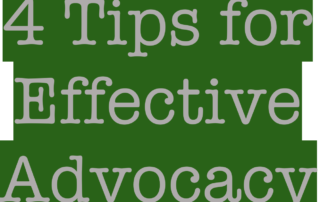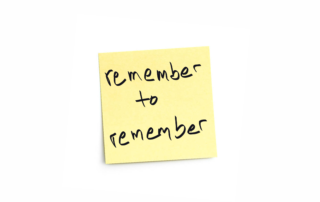**Following my recent webinar focused (ironically) on understanding ADHD, an attendee sent me a message asking for some guidance on how to be an effective advocate. After I responded, I thought maybe I would share it with everyone. This isn’t an exhaustive list, they’re just the first things that came to mind. Do Not Hide The most important place to start is to be out in the open. Talk about your ADHD in a matter-of-fact way. Share your story. You don’t have to work it into your conversation because it is your actual life. The best way to advocate is to educate. What you are educating people about is what ADHD looks like in everyday situations. Once we’ve sown the seeds of awareness, sometimes attraction is more effective than promotion. If all we ever do is advocate and educate then people won’t want to hear from us anymore. There’s an ebb and flow in this process. Everything is a teaching opportunity but not everything is a teaching moment. Find your People Join organizations that promote awareness like CADDRA, CADDAC, CHADD, etc. Follow FB pages or IG accounts that are devoted to building a sense of community within the ADHD world, not just lamenting the current conditions. […]
Hello Worry, My Old Friend
Author: Alex Gheorghe When we are anxious/worried our body automatically triggers its stress response (or “fight or flight”). This our body’s natural reaction system and has evolutionarily been beneficial in something very key… helping us stay alive! Our stress response includes physical and thought responses to our perception of an event or situation. As humans, we welcome predictability and when we feel a significant lack of control, our body can initiate this “survival mode.” When we spend a lot of time in survival mode, the chronic stress can have a negative impact on our mind and body. You may experience tension in your muscles, difficulty sleeping/eating or engaging in day-to-day activities. As someone who has experienced this first-hand, I know how scary and debilitating this experience can be. Feeling like we are trapped by our thoughts and unable to break out of this cycle can leave us feeling helpless and frustrated. It’s important not to be hard on ourselves though. When it comes to managing stress and anxiety (especially in today’s uncertain situations), knowledge is power because knowledge brings with it some predictability. Understanding the reasons behind your behaviour and emotional response are important – most of us aren’t born […]
Join the Club! An Alternative ADHD Screening Tool
The more I work with clients with ADHD and explore the common threads that link us together, the less satisfied I am with the screening tools that are used. It’s not that the tools are inaccurate, it’s that they are incomplete, in my opinion. It is hard to boil the lived experience of ADHD down to 18 questions on a form, I’ll give you that, and you probably don’t want to make the form too long or complicated or the client will get distracted, forget that they are doing it, get bored and put it down and lose it, etc. Having said that, I find that one of the advantages of being a clinician who actually lives with an ADHD brain is that I can sometimes go beyond the surface-level questionnaires and dig a bit deeper into the more subtle aspects of being this way. For this reason, I have come up with my own questionnaire. It is not scored, there is no rating scale and there is no cutoff, categorical designation that tells you whether you “have it” or not. Instead, read through it, or have someone read it to you and think on each item: Can I relate […]
Epigenetics: The Impact of Environment on Development
In new article published online in ADDitude Magazine, Dr. Joel Nigg reviews some recent findings on the impact of environment on the development of ADHD traits. Long thought to be strictly a genetically inherited brain dysfunction, increasing amounts of research (along with increasing amounts of attention paid to previous research) are demonstrating a clear link between ADHD development and the environment. This field of research, focusing on the link between genes and environment, is known as epigenetics. In this case, the prefix epi- refers to something beyond, over, or upon something else. In other words, epigenetics studies the factors beyond simple genetics (if there is such a thing as simple genetics) that influence the development of certain traits. In his article, Dr. Nigg states, “Epigenetics paints a much more complicated view of ADHD, but also a much more optimistic one; genes do not solely determine an individual’s fate.” For those who struggle with ADHD, the round pegs trying to fit into square holes, one of the bleakest aspects of daily life is the belief that things will always be this way and cannot be improved. Epigenetic research is telling us more and more that this belief is false. Nigg reports, […]
Book Excerpt: Impact of Fear on Recollection of Experience
The following is a very brief excerpt from my book, “This is Not That” due to be completed in 2048, based on the current pace. Let me know what you think. “In a rather complicated study, Professor D.B. Fenker and his colleagues (2005) had subjects view a series of emotionally neutral words on a computer screen. Randomly, some words were preceded by pictures of fearful faces or other disturbing images. The exposure to these images, however, was so quick that the individual was not aware that they had even seen the image, referred to popularly as subliminal images. Participants were later shown lists of words and asked to say whether they recalled seeing a word (had a conscious memory of learning it) or knew they had seen the word (they knew they had seen it before but couldn’t remember where or when). The researchers found that when words were preceded by a frightening or unpleasant image, they were more accurately recognized, though not consciously recalled. The implications of this study, and others like it, are momentous. If the brain is so sensitive to negative stimulation as to react in such a powerful way to such an insignificant trigger, imagine its […]
Hard Things Made Easy? Not Quite
As a counsellor, I have been approached for help with a wide variety of issues. Sometimes it is a last-ditch attempt to save a relationship where years of muddy water has passed under the bridge. Sometimes it is eliminating the effects of a life-changing traumatic experience. Sometimes it is rewiring the brain of a child or partner who has special needs or mental illness. Regardless of the specifics, the basic element of many of these problems is the client asking me the following question: How can I do something hard in an easy way?” Predictably, my answer to this question is not always satisfactory. You can’t always clean up the mud, you can’t always erase trauma, you can’t always rewire someone’s brain, and even if any of these things are possible, it is never easy. There are many ingredients to change, but most important to the recipe is time and effort. Education that leads to understanding can certainly help this process, along with the support of the important people in your life, but even these tools can only go so far in the absence of time spent working on the issue. I’m not just referring to time spent on the […]
Three Kinds of Procrastination and What to Do About Them: Part 3
Truth be told, even though these posts are all being published within a few days of each other, I originally started the series back in July. Don’t worry, three months is hardly even in the ballpark of my all-time record for procrastination. I once went seven years between journal entries. Anyway, I hope you’ve got something so far out of the series. Here’s the final instalment. 3. Defiance and Rebellion (Counterwill) Gordon Neufeld, child psychologist and author of the best-selling book “Hold On to Your Kids”, often refers to a natural, instinctive phenomenon which is known as counterwill. Simply stated, counterwill is the instinct to resist the efforts of others to control us. Neufeld demonstrates this instinct in his lectures by inviting an audience member to hold their hand up. He then pushes gently against their hand. As he does so, it is plain to see that, without any thought, the audience member instinctively pushes back. As I said before, counterwill is an instinctive response. However, it may grow much stronger in unhealthy environments. If you are a child who is overly controlled by a parent or authority figure, you may adapt by acquiescing and completely abandoning your own will […]













Recent Comments